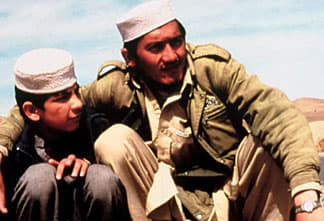In This World is a shot-on-the-run docudrama about two Afghan refugees risking life and limb to emigrate to the West. It's a serious, compassionate film and it has been garnering glowing reviews on the festival circuit (even winning the Golden Bear at the 2003 Berlin International Film Festival), but it is also enormously dull. Films with noble, humanist messages often get the soft treatment from critics, but in this case, they've gone too far in divorcing the film's intentions from its actual merits.
Hoping to capture the reality of the refugee experience on film, British director Michael Winterbottom travelled to a camp in Pakistan and recruited two young Afghan men Enayatullah and Jamal Udin TorabI to be his subjects. The planned film had no real script, apart from a vague outline, so the two non-actors were largely left to improvise their roles as they made their uneasy way from eastern Pakistan to Iran and then on to Turkey, Italy, France, and the UK. Passports were secured for both of them, but because Winterbottom and his small crew were in the Middle East under false pretences (they claimed they were making a documentary about the Silk Road), the staged journey became, at times, almost as risky as if it had been real. Which makes it that much more unfortunate that the resulting film isn't better than it is.
In This World fails because it refuses to acknowledge that its techniques which are basically the unobtrusive fly-on-the-wall techniques of documentary are insufficient to that of fiction film. To illustrate, let's take a simple example: a close-up of Jamal. If this were a true documentary, we could be examining Jamal's face for hints of what he's thinking or feeling. But because we know the scene has been staged and that Jamal is not really there of his own accord that he is merely playing at being Jamal his face reveals nothing. The shot becomes merely a record of an "actor" acting, which would be acceptable if Jamal could act. Even the most "real" sequences in the film a couple of encounters with actual border guards fail to come off because Winterbottom's shaky, cinema vérité digital camera images are simply too inexpressive to engage us imaginatively. (At several key points, the images are so dark we can't even tell what's going on.)
In This World may have an urgent, important subject, but it lacks both the imaginative dimensions of fiction and the clarity and detail of documentary, falling into some sort of dead-zone in between. (Mongrel Media)
Hoping to capture the reality of the refugee experience on film, British director Michael Winterbottom travelled to a camp in Pakistan and recruited two young Afghan men Enayatullah and Jamal Udin TorabI to be his subjects. The planned film had no real script, apart from a vague outline, so the two non-actors were largely left to improvise their roles as they made their uneasy way from eastern Pakistan to Iran and then on to Turkey, Italy, France, and the UK. Passports were secured for both of them, but because Winterbottom and his small crew were in the Middle East under false pretences (they claimed they were making a documentary about the Silk Road), the staged journey became, at times, almost as risky as if it had been real. Which makes it that much more unfortunate that the resulting film isn't better than it is.
In This World fails because it refuses to acknowledge that its techniques which are basically the unobtrusive fly-on-the-wall techniques of documentary are insufficient to that of fiction film. To illustrate, let's take a simple example: a close-up of Jamal. If this were a true documentary, we could be examining Jamal's face for hints of what he's thinking or feeling. But because we know the scene has been staged and that Jamal is not really there of his own accord that he is merely playing at being Jamal his face reveals nothing. The shot becomes merely a record of an "actor" acting, which would be acceptable if Jamal could act. Even the most "real" sequences in the film a couple of encounters with actual border guards fail to come off because Winterbottom's shaky, cinema vérité digital camera images are simply too inexpressive to engage us imaginatively. (At several key points, the images are so dark we can't even tell what's going on.)
In This World may have an urgent, important subject, but it lacks both the imaginative dimensions of fiction and the clarity and detail of documentary, falling into some sort of dead-zone in between. (Mongrel Media)
